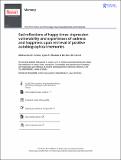Files in this item
Sad reflections of happy times : depression vulnerability and experiences of sadness and happiness upon retrieval of positive autobiographical memories
Item metadata
| dc.contributor.author | Isham, Aleksandra E. | |
| dc.contributor.author | Watson, Lynn A. | |
| dc.contributor.author | Dritschel, Barbara | |
| dc.date.accessioned | 2022-08-10T16:30:08Z | |
| dc.date.available | 2022-08-10T16:30:08Z | |
| dc.date.issued | 2022-08-09 | |
| dc.identifier | 280815300 | |
| dc.identifier | beac1892-377d-4474-9e0b-f3fe3bbda393 | |
| dc.identifier | 85135685362 | |
| dc.identifier | 000838042600001 | |
| dc.identifier.citation | Isham , A E , Watson , L A & Dritschel , B 2022 , ' Sad reflections of happy times : depression vulnerability and experiences of sadness and happiness upon retrieval of positive autobiographical memories ' , Memory , vol. Latest Articles . https://doi.org/10.1080/09658211.2022.2105364 | en |
| dc.identifier.issn | 0965-8211 | |
| dc.identifier.other | RIS: urn:773333F6244AE43EA34DD7366EF02B1E | |
| dc.identifier.other | ORCID: /0000-0002-0909-6323/work/117211017 | |
| dc.identifier.uri | https://hdl.handle.net/10023/25817 | |
| dc.description.abstract | Instructed retrieval of positive autobiographical memories typically improves mood for healthy individuals, but not always for depressed individuals. No mood improvement may occur when depressed individuals retrieve positive memories that are self-incongruent, or when they ruminate upon positive memory retrieval. Mindfulness is associated with lower self-incongruency and rumination. The present study examined whether recurrent depression predicted emotional experience upon involuntary and voluntary retrieval of positive memories, and whether recurrent depression and trait mindfulness were associated with emotional experience upon positive memory retrieval through state rumination and self-incongruency. Recurrently and never-depressed individuals completed measures of depression, trait mindfulness, and a diary for reporting on everyday positive memories. Recurrently depressed individuals reported diminished happiness upon retrieving involuntary and voluntary positive memories compared to never-depressed individuals; and greater sadness upon involuntary positive memory retrieval, independent of current depression. Recurrent depression was associated with diminished happiness upon involuntary memory retrieval and greater sadness upon involuntary and voluntary positive memory retrieval, through state brooding, self-incongruency, or both. Higher trait mindfulness was associated with lower sadness upon involuntary and voluntary positive memory retrieval through state brooding and reflection. These findings highlight potential mechanisms in the relationship between depression vulnerability and emotional processing of positive autobiographical memories. | |
| dc.format.extent | 14 | |
| dc.format.extent | 1902273 | |
| dc.language.iso | eng | |
| dc.relation.ispartof | Memory | en |
| dc.subject | State emotion regulation | en |
| dc.subject | Depression vulnerability | en |
| dc.subject | Autobiographical memory | en |
| dc.subject | Mindfulness | en |
| dc.subject | Naturalistic | en |
| dc.subject | BF Psychology | en |
| dc.subject | E-NDAS | en |
| dc.subject.lcc | BF | en |
| dc.title | Sad reflections of happy times : depression vulnerability and experiences of sadness and happiness upon retrieval of positive autobiographical memories | en |
| dc.type | Journal article | en |
| dc.contributor.institution | University of St Andrews. University of St Andrews | en |
| dc.contributor.institution | University of St Andrews. School of Psychology and Neuroscience | en |
| dc.contributor.institution | University of St Andrews. Institute of Behavioural and Neural Sciences | en |
| dc.identifier.doi | 10.1080/09658211.2022.2105364 | |
| dc.description.status | Peer reviewed | en |
This item appears in the following Collection(s)
Items in the St Andrews Research Repository are protected by copyright, with all rights reserved, unless otherwise indicated.

